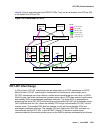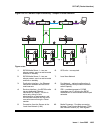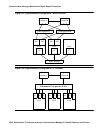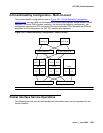
PKT-INT (Packet Interface)
Issue 1 June 2005 1803
Planned PKT-INT Interchange (Link Migration)
A planned interchange of PKT-INTs uses link migration to assure that no data is lost during the
interchange. On a planned interchange of PKT-INTs, software initiates the link migration by
sending commands to the active and standby PKT-INTs to make a peer link between the
PKT-INTs and to start the link migration process. Down-stream and up-stream messages can
be processed by the PKT-INTs during the link migration process. As long as the PKT-INT
interchange has not been completed, PCD should continue to send down-stream messages to
the active PKT-INT. If a down-stream data packet is for a link that has not yet been migrated
over to the standby PKT-INT, the active PKT-INT processes it and sends it out.
If a down-stream data packet is for a link that has already migrated over to the standby
PKT-INT, the peer link forwards the down-stream data packet to the standby PKT-INT, and the
standby PKT-INT processes it and sends it out. Up-stream messages during migration are
handled by both PKT-INTs as with the down-stream messages. The PKT-INT that controls the
link (the active PKT-INT if the link has not yet been migrated, and the standby PKT-INT if the
link has been migrated) processes the up-stream data packet and sends it up to the PCD.
During the migration process, both the active and the standby PKT-INTs can send up-stream
messages to the PCD.
On DEFINITY Server R, during the migration process, the standby PKT-INT terminating a link
processes the up-stream packet and forwards it to the active PKT-INT, which sends it up to the
PCD.
On S8700, all down-stream packets go to the active PKT-INT, but the up-stream packets can
come from the active and the standby PKT-INTs during the migration process.
● Link migration is performed to prepare the standby PKT-INT for a hot reset.
● RNRs are not sent to the endpoints at the start of the link migration.
● PCD tells the active and standby PKT-INTs that a link migration is starting.
● LAPD links are migrated from the active-mig PKT-INT to the standby-mig PKT-INT in the
order they appear in the internal list.
● Active-mig PKT-INT continues to accept up-stream messages for the links that are not yet
migrated. The standby-mig PKT-INT starts accepting up-stream messages for the links
that are migrated. Both the active-mig and the standby-mig PKT-INTs send up-stream
messages to the PCD.
● PCD accepts up-stream messages from both the active-mig and standby-mig PKT-INTs.
● PCD sends every down-stream message to the active-mig PKT-INT and has the
active-mig PKT-INT send it out for those links that have not been migrated or forward it to
the standby-mig PKT-INT for those links that have been migrated.
● At the end of the migration, the active-mig PKT-INT tells the PCD that the migration is
finished, and PCD tells the standby-mig PKT-INT to go active (hot interrupt). Some
coordination verifies that every up- and down-stream message has been flushed from the
active-mig PKT-INT before completing the interchange.


















